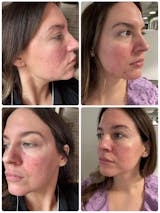Welcome! Over the next ten days, we will empower you with the basics to get to clear skin. This toolkit will include education, advice on skincare and a community who you can chat with on your skincare journey.
Through this series, you will be getting personalized recommendations on how to beat acne on sensitive/combination skin.
To start, let’s focus on what not to do when it comes to acne:
1. Don’t Throw Everything At It
It is our natural response to throw one product after another on our acne in the hopes for a quick fix. This usually agitates the skin and makes the acne more inflamed.
Your skin turns over in 8-week cycles so you should commit to an acne treatment for at least eight weeks (ideally three months) before evaluating the effectiveness of the product.
You should not introduce new products into your routine until you have completed each cycle so that you have a clean signal as to what works vs what doesn’t work.
2. Don’t Overwash
Washing too frequently or using strong cleansers will overstrip your lipid barrier, making your skin more susceptible to irritation and forcing it to overproduce oil. The agitation will cause more inflammation in your acne and cause more pain and scarring down the road.
For 90% of the population, a gentle non-foaming cleanser is the right choice. It will do the job to remove the grime and debris without overstripping the oils that form your lipid barrier.
If there are days that you feel extremely oily, spend more time working a gentle cleanser on your skin and you will see that it makes a big difference on how much oil is removed.
Wash once in the morning and once in the evening using lukewarm water and use cloth to pat dry. We’ve designed our Cleanser with a peppermint tingle so that you can “feel” when the cleanser has removed just the right amount of oil… once the tingle sets in, you’ve gotten just enough of the oils out.
3. Don’t Pop
It may be tempting to squeeze out a large pimple but doing so will likely make the situation worse, dermatologists say.
Think of a pimple as a shaft keeping the bacteria contained inside a pore as the body fights off infection.
Popping anything causes your skin to physically break apart, making it more susceptible to infection and an even bigger problem than what was originally there in the first place, says Dendy Engelman, MD, a board-certified dermatologist.
Furthermore, the squeezing action may drive pus and bacteria even deeper into your skin, Your fingers may introduce new kids of bacteria into an open wound leading to complications. It may also lead to permanent scarring.
Instead, use a leave-on lotion that will help to flatten pimples quickly. The Clear Out contains a high dosage of AZA. A great deal of research has shown that AZA will significantly diminish the appearance of skin blemishes, fade post-acne marks and improve skin tone.
4. Don't Scrub
Physical exfoliants are effective at removing dead skin outside of your pore. However, it does little to remove the dead skin inside your pore (see illustrations in the next email), which is usually what causes clogs and pimples in the first place.
Scrubs are able to slough away the dull/sallow layer of dead cells on the surface of your skin but if you have active breakouts, scrubs may worsen acne because the abrasive particles can irritate and further inflame acne lesions.
Wait until pimples have subsided before reaching for the scrub jar.
5. Don’t Use Liquid or Long-Wear Foundation
These products are generally occlusive and require stronger cleansers or makeup removers to take off. Opt for a light mineral-based foundation and spot concealers until we can stop the new breakouts from surfacing.
For More Questions ...
Please message us by clicking Send Message from our Facebook page or Instagram profile or by visiting this link: https://m.me/clearlybasics
Disclaimer:
Nothing on this article should be interpreted as personal medical advice. For medical related matters, please consult with your dermatologist.









